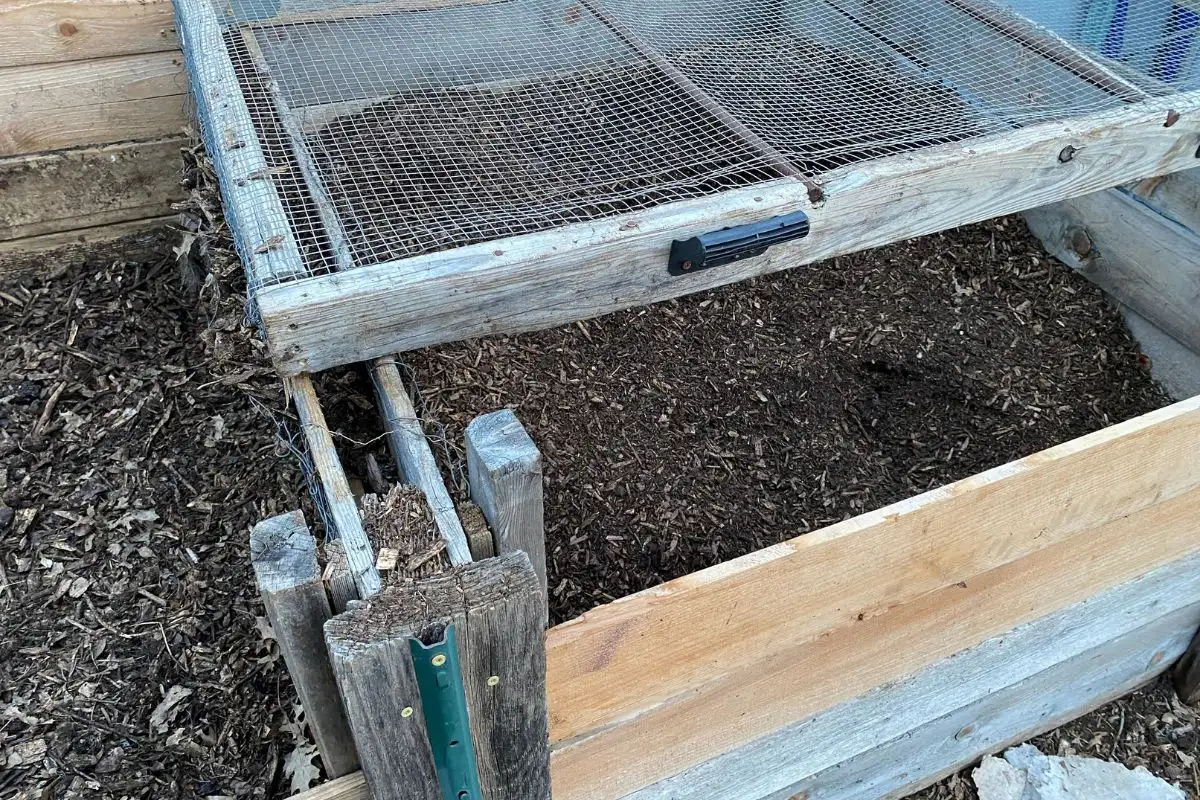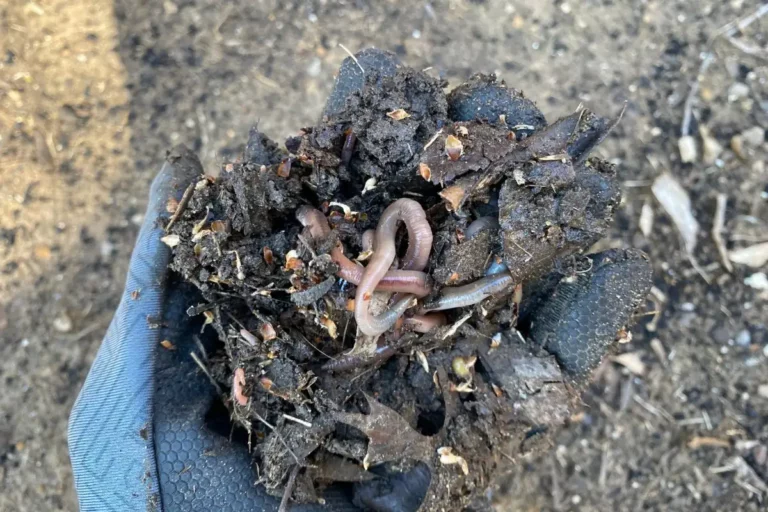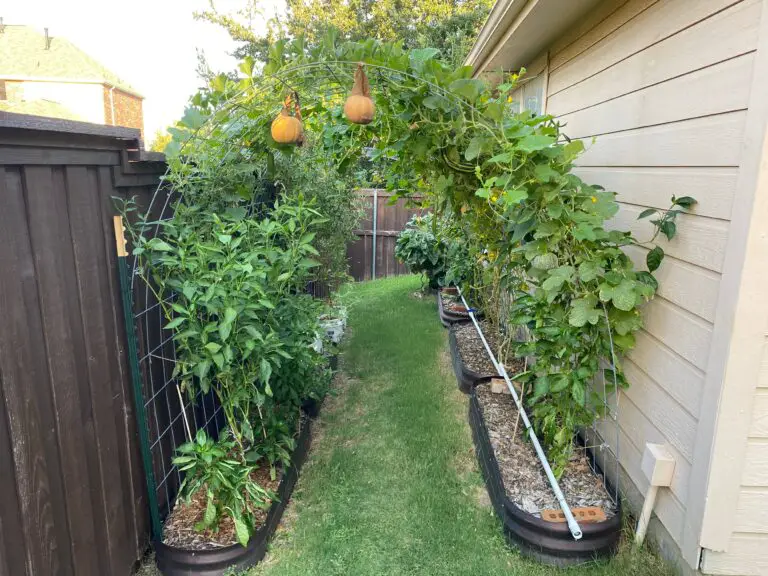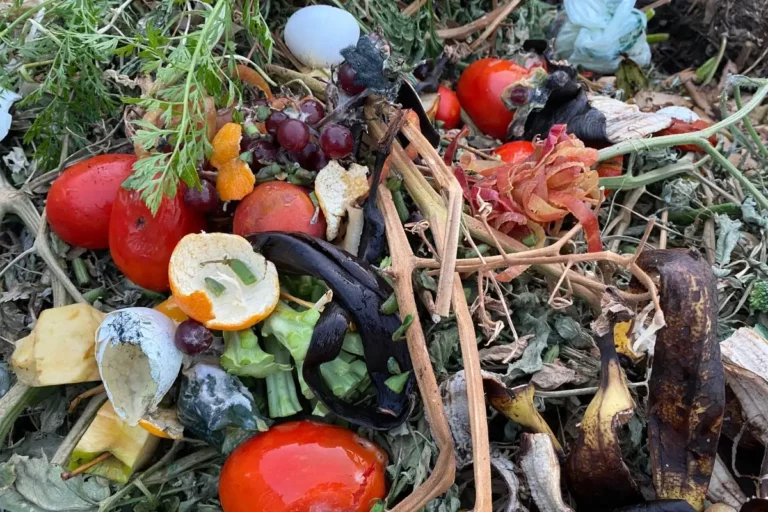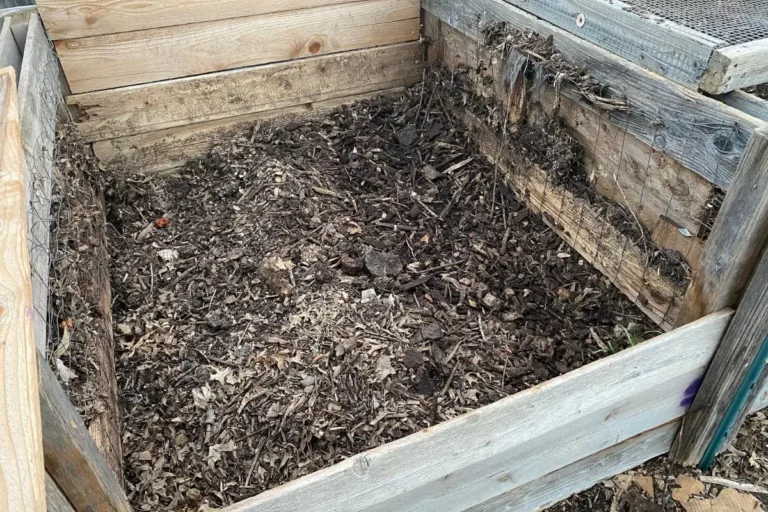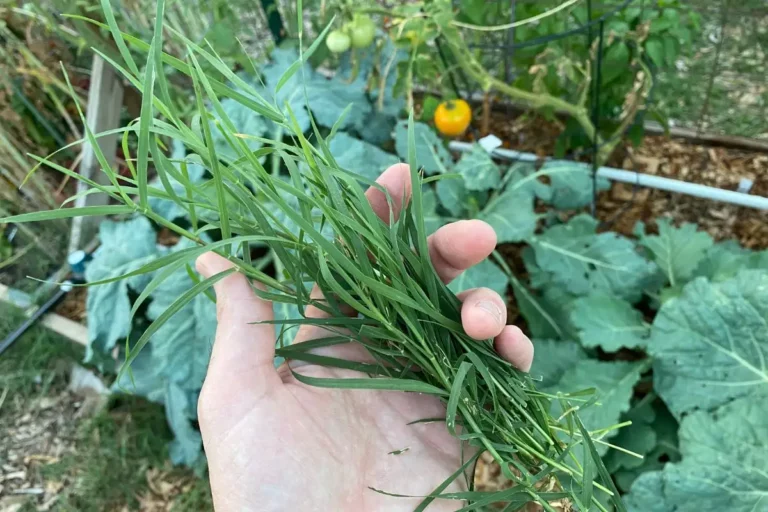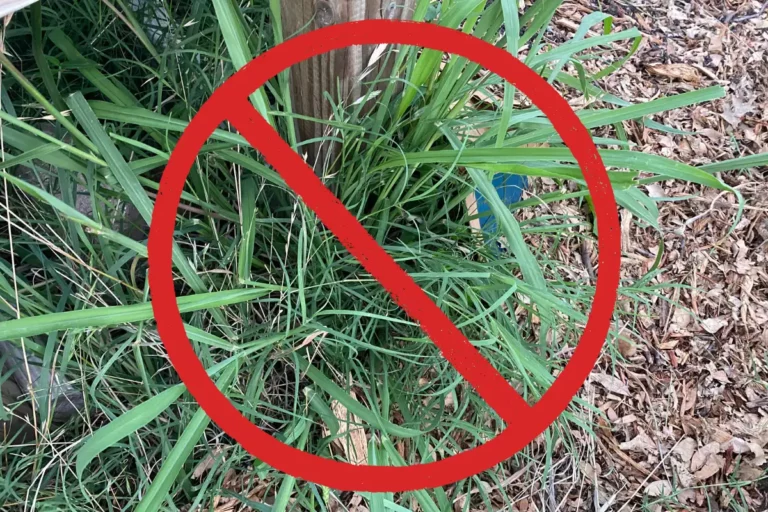Making Compost Fast: 50+ Items That Decompose Quickly
Many years ago, I used to toss most things in the trash, but once I started composting, I loved watching my kitchen scraps and garden waste turn into nutrient-rich compost.
I wasn’t just reducing the amount of waste my family sent to the landfill. I was also replenishing my soil each year, converting garbage into “black gold” and enriching my garden.
Obviously, the quicker you compost, the faster your garden benefits, so you might be wondering, “What items decompose fastest?”
Kitchen scraps such as coffee grounds, fruits, and vegetables decompose quickly, as well as garden waste like chopped-up grass clippings or finely mulched leaves. However, factors such as material size, moisture levels, and air circulation will inevitably impact the decomposition process.
To give you a better understanding of this topic, I’ll cover the following in this article:
- The materials that typically decompose in 1-2 months.
- The materials that typically decompose in 3-5 months.
- The materials that typically decompose in 6-8 months.
- The materials that typically decompose in 9-12 months.
- Some of the slower decomposing materials and what to do about them.
Now that we’ve covered some of those basics, let’s dive into the details and discover what materials you can expect to compost in record time!
What Materials Turn Into Compost Fastest?
I love composting just about everything I can, but I’m especially fond of composting kitchen scraps and garden materials that I know will break down in 6 months or less.
I don’t mind composting materials that take 7-12 months to fully decompose, but I realize that I’m making a longer-term commitment with those items than I am with things that break down after only a couple of months.
Before I provide lists of items that generally decompose in 1-2 months, 3-5 months, 6-8 months, and 9-12 months, I want to give a quick overview of what’s happening in your compost bin so that you understand why exactly your materials are decomposing so quickly.
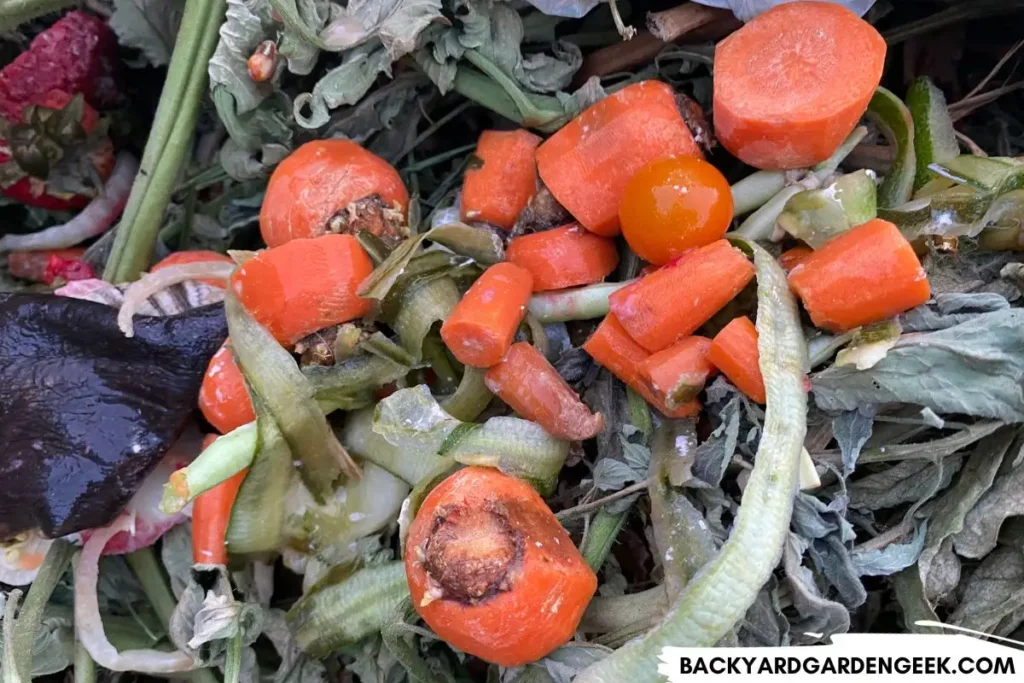
| Microbial Activity | The primary agents of decomposition in a compost pile are microorganisms such as bacteria, fungi, and actinomycetes. These microbes feed on organic materials, breaking them down into simpler substances. |
| Moisture & Oxygen | Water acts as a catalyst, enabling microbes to transport nutrients and move about. Oxygen, on the other hand, supports the metabolism of aerobic bacteria, which are some of the most efficient decomposers in the pile. This is why you want your compost to be moist and why you should turn it regularly. |
| Rising Temperatures | As the microbes break down the organic material, they generate heat. This heat further accelerates microbial activity, making the decomposition process even faster. |
| Nitrogen & Carbon Ratios | Kitchen scraps (like vegetable peels) are typically high in nitrogen, while yard waste (like dried leaves) are high in carbon. A 30:1 carbon-to-nitrogen ratio creates an optimal environment for microbial growth and decomposition. |
| Physical Structure Breakdown | Fungi and certain bacteria produce enzymes that break down cellulose and lignin, which are structural components of plants. This breakdown transforms rigid plant structures into softer, composted material. |
| Presence of Invertebrates | Earthworms, pill bugs, beetles, and other creatures feed on decomposing materials, breaking them down further. Their waste (or castings, if we’re talking about worms) is a nutrient-rich addition to the compost. |
| Acidic Byproducts & pH Levels | Here’s all you need to know: As pH levels rise and fall in the compost pile over time, different microbes become more active, each playing a role at various stages of decomposition. |
| Humification Process | As decomposition progresses, the organic materials in your compost will transform into humus. Humus is a rich organic material that, when mixed in with your garden soil, will provide an environment that’s great for plant growth. |
| Reduction in Volume | As the decomposition process continues, there’s a noticeable reduction in volume. This is due to water loss, carbon dioxide release, and the conversion of bulk materials into smaller particles. |
| Mature Compost Formation | With time, the composting materials transform, leading to a dark, crumbly, and earthy-smelling substance. This mature compost is filled with nutrients, beneficial for plant growth and soil health. |
As you can tell, there’s a lot going on in your compost pile, especially below the surface.
This is why it’s so important to balance ingredients, maintain proper moisture levels, and regularly turn your compost to ensure efficient, ongoing decomposition.
1. Items That Decompose in 1-2 Months
When it comes to decomposition, let’s now talk about those materials that’ll break down very fast.
Please note that kitchen and garden scraps will always compost faster if you slice them, peel them, chop them, or dice them.
(The smaller the pieces, the faster they’ll turn into beautiful compost!)
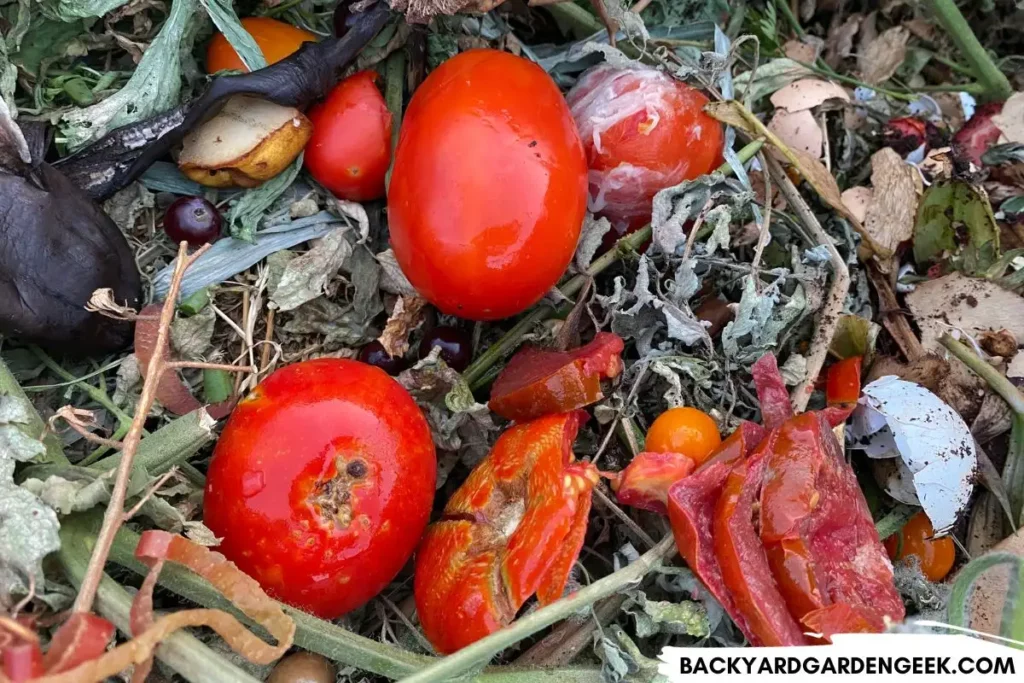
If you leave materials whole, they’ll take much longer than 1-2 months to compost, but in general, the items in the list below will decompose very fast once you toss them in your compost bin and expose them to the elements as well as the worms and microbial organisms that live below the surface:
- Apple peels and cores
- Arugula
- Asparagus (especially the wispier parts of the plant)
- Beans (pods and beans)
- Beet tops
- Bread
- Broccoli stems and florets (if chopped up)
- Brussels sprouts (if chopped up into small pieces)
- Cabbage leaves
- Carrot tops, greens, and peels
- Cauliflower stems and florets (if cut up well)
- Celery (if chopped into small pieces)
- Corn cobs (if chopped up well)
- Corn husks (if cut up into tiny pieces)
- Cucumber peels and seeds
- Eggshells (if crushed finely)
- Flowers (if they’re chopped up)
- Kale
- Leeks
- Lettuce and other leafy greens
- Mushrooms
- Onion skins and tops
- Peas (pods and shells)
- Pear peels and pieces
- Peppers (if diced up)
- Potato peels and pieces
- Pumpkin shells (if you break them into small pieces)
- Radish tops and roots
- Rice (cooked)
- Spinach
- Swiss chard (if stems are chopped up well)
- Tomatoes
- Turnip greens
- Zucchini and other squashes
If you’ve been tossing your kitchen scraps in the trash, I highly recommend purchasing a nice-looking kitchen compost container, collecting your kitchen scraps, and throwing everything in the compost bin.
Just be sure to purchase a container with a tight-fitting lid. I made that mistake once, and the container let some unpleasant smells out in my kitchen. This is why I like the Joe & Leah compost container. It keeps those nasty smells from getting out!
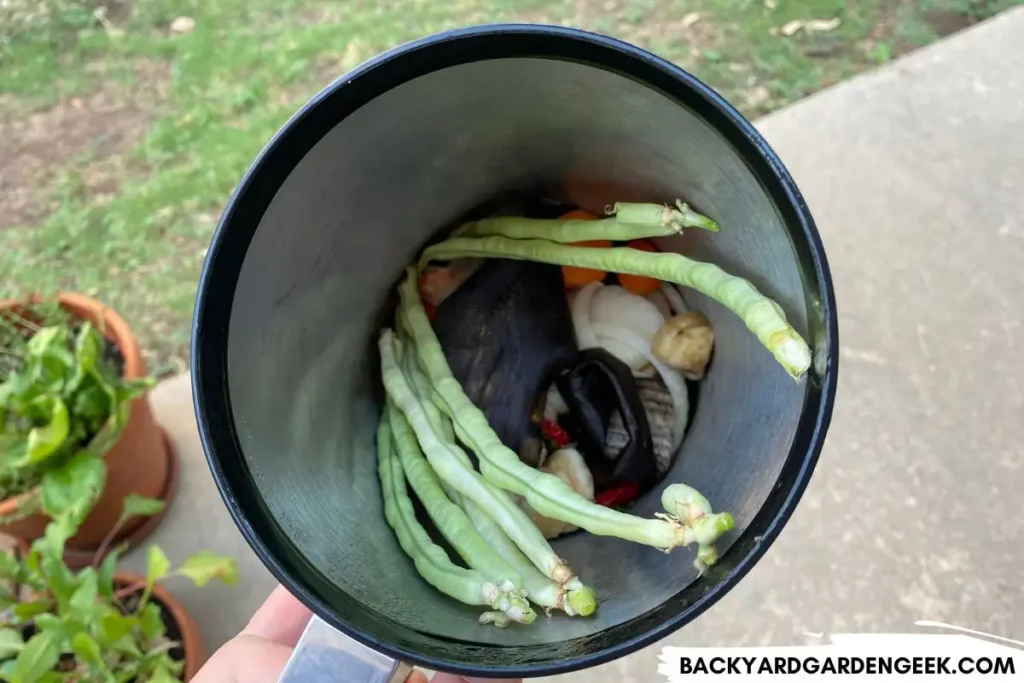
(In fact, you can compost these items directly in the soil if you want to experiment with direct composting or trench composting!)
If you compost the items above instead of throwing them away—and if you’re careful to maintain the right carbon-to-nitrogen ratio—you’ll have a free, nutrient-rich soil amendment in just a few months. Your garden will thank you for it!
2. Items That Decompose in 3-5 Months
Unlike the items in the first list, the materials found below will take a bit longer to decompose and transform into useful compost.
You’ll likely need to turn your compost every so often since these items need to be exposed to air and the elements to speed up the composting process as much as possible.
All of these are great to compost, but you just have to be a bit more patient as you wait for them to decompose.
- Banana peels
- Beans (if they’ve dried out)
- Coffee grounds and used paper filters
- Collard greens
- Egg cartons (the cardboard kind)
- Garlic stems
- Grass clippings
- Leaves (from trees and most garden plants)
- Manure (from farm animals like cows, goats, horses, rabbits, and sheep)
- Nutshells (if smashed up a bit beforehand, not including black walnut)
- Paper towels and napkins (clean, not greasy)
- Pasta (cooked, no oils)
- Seaweed and kelp
- Shredded cardboard
- Shredded newspaper
- Straw or hay
- Tea bags (paper only with no staples)
- Weeds (but be very careful when composting weeds)
For many of the materials listed above—like coffee filters, egg cartons, paper products, cardboard, and newspaper—the rate of decomposition will entirely depend on the size of the material when you add it to your compost bin.
As an example, if you drop a folded-up newspaper into your compost bin, that’s going to take much longer than 3-5 months to decompose. But if you shred the material beforehand into tiny pieces, the paper will easily decompose in under 5 months.
Simply put, if you’re willing to put in a little extra effort preparing your materials for the compost bin, you’ll find that they decompose much faster than if you just tossed them in there without much forethought.
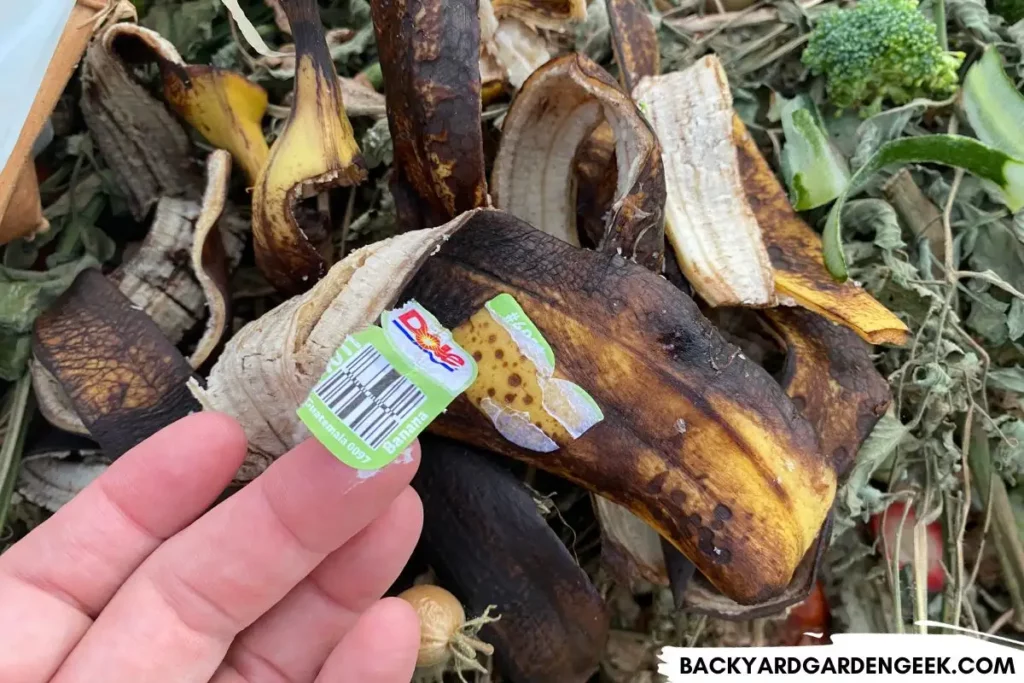
3. Items That Decompose in 6-8 Months
The items in the list below are perfect for composting, but you’ve got to be patient with them, and you’ll need to tend to your compost over time—keeping it moist and turning it whenever necessary—to ensure it composts in as timely a manner as possible.
Here’s something to consider: Anything that contains the protein keratin (such as hair, nails, or feathers) is going to take at least 6-8 months to decompose, but these materials could take longer than that depending on their size when you add them to your compost pile.
Best to cut or break such items into smaller pieces beforehand to speed up the process!
- Celery (if not chopped up since it’s so stringy)
- Cornstalks
- Cotton fabric (natural and cut into small strips or pieces)
- Feathers (if cut up a bit)
- Fruit pits (if crushed up a little)
- Garden waste (medium-sized and non-woody)
- Nutshells (if left whole)
- Natural fiber materials (hemp and sisal, if small enough)
- Pine needles
- Sawdust
- Wood chips (smaller pieces)
When it comes to nutshells, please don’t ever put black walnuts in your compost. Black walnut trees have natural chemicals in them that you don’t want anywhere near your garden.
And when it comes to wood, the decomposition process entirely depends on size. Smaller pieces take just a few months. Larger sticks take longer. Big logs and tree trunks can take years to fully break down!
4. Items that Decompose in 9-12 Months
I generally want my compost pile to do its magic in under 8 months, but some things take up to a year to fully decompose due to their stringy or woody nature or the sheer size of the material.
As I’ve noted above, the more you can cut, chop, chip, or smash, the quicker these materials will decompose in your compost bin:
- Cardboard and pizza boxes (non-shredded)
- Coconut shells
- Cotton fabric (natural materials, not synthetic)
- Feathers (if unbroken)
- Fruit pits (if left whole)
- Hair (pet or human)
- Hardy stems
- Pine cones
- Plant stems (that are a little thick)
- Sticks
- Twine (natural fibers)
- Weed seeds (some can even last years!)
- Wood ash
- Wood chips (the larger pieces)
If you want to make the most of your compost, do whatever you can to cut these items down to size or (in the case of cotton, hair, and wood chips) make sure you don’t clump them all together when you add them to your compost pile.
When you separate such materials and mix them well with other carbon and high-quality nitrogen sources, you’ll likely increase the speed of decomposition.
What Materials Take More Time to Decompose and Compost?
I love composting almost everything from my garden, assuming the plant scraps aren’t diseased or infested by aphids, spider mites, whiteflies, or other pests.
But please be warned that some garden materials will take much longer to compost than others if you don’t chop up those materials ahead of time.
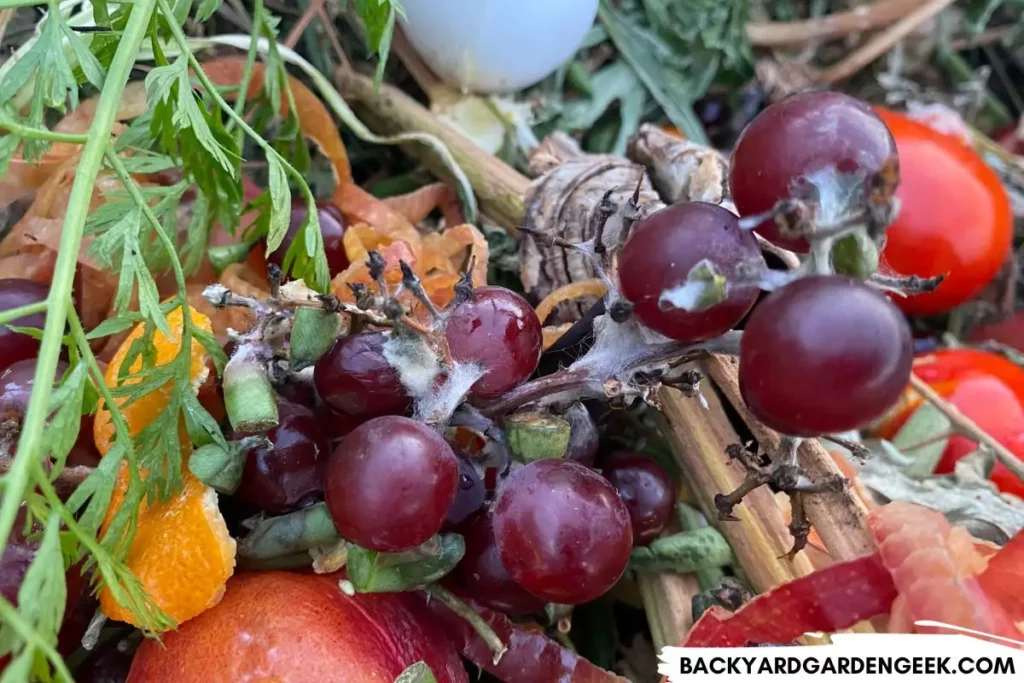
The items listed below will take quite some time to decompose (sometimes longer than a year)—and along the way, they’ll clog up your compost bin—so I recommend 1 of 2 approaches:
- Cut Them Up: If you’re willing to cut up your kitchen scraps, chop up your garden scraps, or run dried vines, stalks, or branches through a chipper, do it! That way, the smaller pieces will decompose much faster, giving you more compost in a faster amount of time.
- Pile Them Separately: If you’ve got space on your property, and you don’t want to go to the hassle of cutting, chopping, or chipping, take the items below and create a compost pile with them in a corner of your property. Just pile them out there and let them sit for months on end, adding other materials as needed to help the decomposition process along. Given enough time, these items will decompose just fine, but they’ll need lots of time for that to happen, so a separate compost pile will do the trick.
Please note that if you plan on using a chipper to handle vines and other large materials, you’ll want to let those dry out thoroughly before putting them through your chipper. You want them to be completely dry so that they go through the chipper easily instead of gunking it up with wet plant material.
Here’s the list of kitchen and garden scraps that’ll take quite some time to decompose if you don’t cut, chop, or chip them in any way:
- Avocado pits
- Blackberry branches
- Broccoli stalks
- Brussels sprouts stalks
- Cauliflower stalks
- Collard greens stalks
- Corn cobs and stalks
- Eggplant stalks
- Grape vines
- Loofah vines
- Malabar spinach vines
- Okra stalks
- Pepper stalks
- Pumpkin vines
- Squash vines
- Tomato stalks and stems
- Wood (large logs and tree trunks)
Even though these items take a rather long time to compost, they’ll eventually turn into nutrient-rich material.
But if you cut them, chop them, or chip them up, you’ll see them decompose in just a few months, much like the other materials you’re adding to your compost pile.
Just know that there are some plants you should never compost. If you’ve got these plants on your property, don’t add them to the compost bin. Toss them in the trash instead!
More Compost-Related Articles
If you’ve enjoyed learning more about compost and decomposition times, you might like reading further:
- Do Raised Beds Need Yearly Compost? (Here’s What to Do)
- Filling Raised Beds with Just Compost: Should You Do It?
- Is Dawn Dish Soap Safe to Compost?
- Is Your Leftover Pizza Compost-Friendly?
- Should Compost Be Tilled In or Mixed with Soil?
- Should I Put Cardboard at the Bottom of My Compost Bin?
- Should You Cover Your Compost Heap in Winter?
- What Goes at the Bottom of a Compost Pile?
